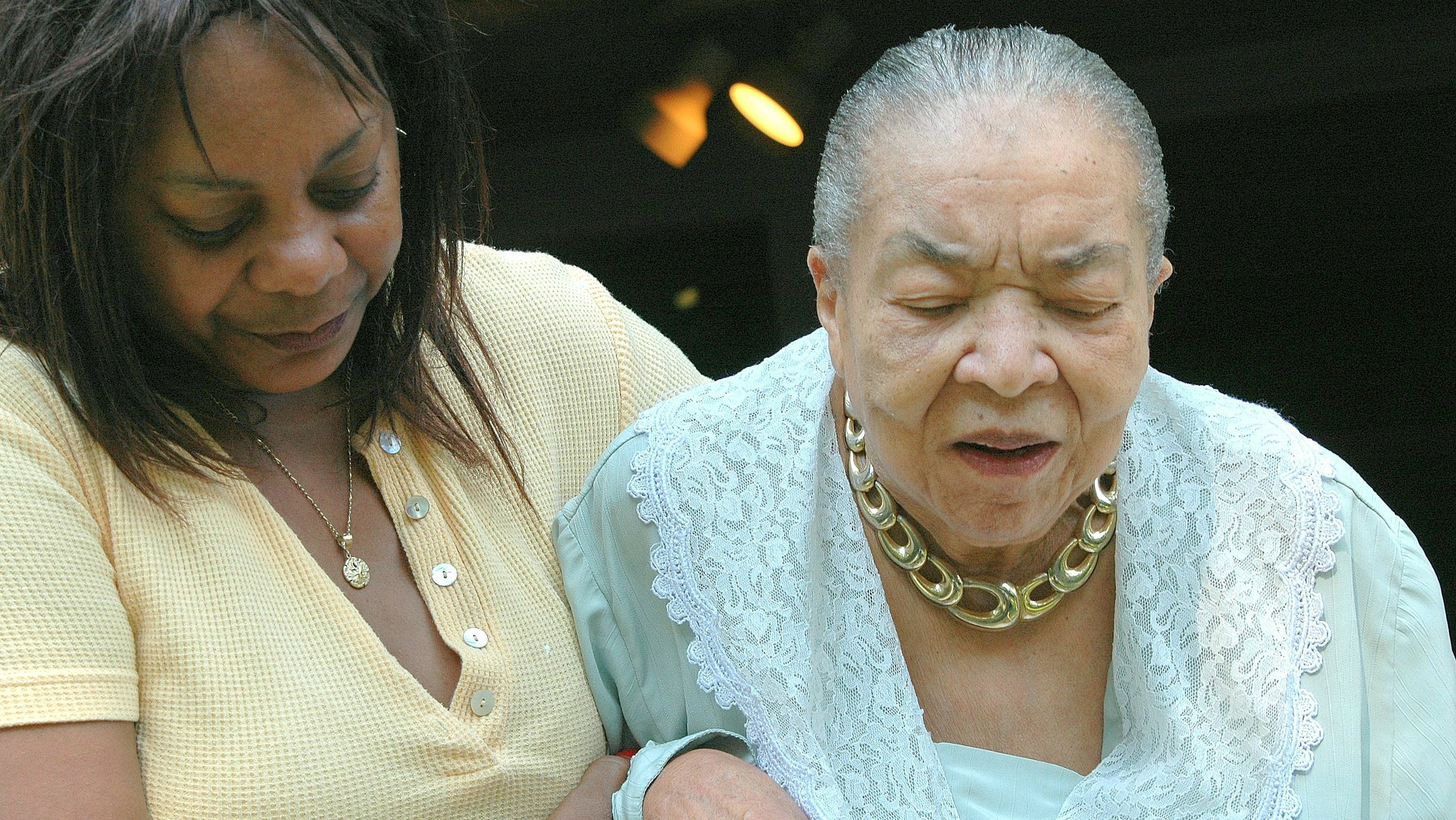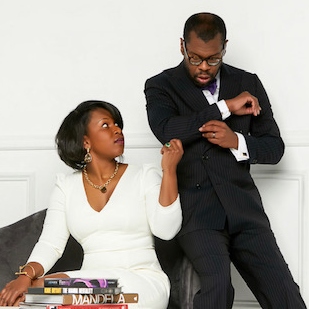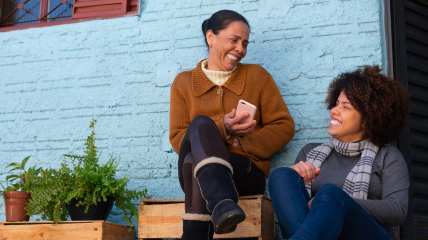Notes on faith: Honoring grief and the sacred act of caregiving
Loss is an inevitable part of life, but how can we be more intentional in caregiving and honoring our elders while they are with us?
“Grief has its own rhythm.” Truer words have never been spoken than in this insight by recording artist Jazmine Sullivan as she withdrew from headlining the 2023 Afropunk Brooklyn Festival and other appearances following her mother’s death from breast cancer. Similarly, Drew Sidora of “Real Housewives of Atlanta” recently announced her father’s passing, sharing an emotional tribute and connecting with fans over shared experiences with Alzheimer’s disease and dementia. Despite the protracted nature of her father’s ailment, she confessed, “You’re never prepared for the inevitable.”
Indeed, grief has its own rhythm. It is unruly; it sweeps over, grabs ahold, takes up space, and does not care about plans. Grieving is what we do for those we love, hope for, and experience, even in the wake of those whose journeys evade us. And yet, sometimes a layer of unaccounted-for grief is not simply that we miss our departed and don’t feel we took time to honor their memory. It is also that we realize there are ways to be more intentional in our lives before the inevitable transition occurs.

The fact is losses are an inevitable part of living. Even while writing this week’s ”Notes on faith,” we received calls from a parent experiencing a medical emergency scare and news that a godmother is recovering from a serious illness. Like many others, we were compelled to make strategic decisions to be present for our loved ones. As they grow older, navigate illness, or inevitably transition, caregiving for aging parents and loved ones becomes a spiritual journey where routine tasks transform into sacred connections that honor life’s cycles.
Is there a way to be intentional in our rituals of care, infusing meaning into our responses so that we live and love well together? We believe care is both personal and communal, especially when designed with spiritual priorities in mind. We have a sacred duty to ensure that these same qualities are reflected in our attentive care for our aging elders, turning daily tasks into expressions of love and honor, as emphasized in scriptural teachings like Ephesians 6:1-3.
“… ‘Honor your father and mother’ — which is the first commandment with a promise — ‘so that it may go well with you and that you may enjoy long life on the earth.'” — Ephesians 6:1-3
To honor someone is to hold them in high regard and respect. Whether we have had ideal or complicated relationships with our parents, elders or loved ones, properly honoring them has a significant impact; we honor the Divine Creator through these practices. Finding ways to care for, honor or pay homage is an investment not just in the person but in our collective future. Through it all, the intention of honoring connects us to the Divine in ways that add immeasurable and unexpected value to our lives. Here we offer a couple of examples to consider:
- Exercise the “ministry of presence”: Though many of us have been socialized to focus on gift-giving as a demonstration of appreciation, the gift here is being a witness to our elders’ experience. Ministry of presence includes completing an errand checklist with which the loved one may need assistance or dropping off a meal. Attentiveness during this time is a spiritual practice in which we exchange wisdom, understanding, and love.
- Make your care sacred and intentional: Sacred care intuitively anticipates and acknowledges feelings of discomfort, isolation, and waning spirits that accompany the natural progression of aging. We can anticipate the emotional vulnerabilities brought on by holidays, reminders of anniversaries, and the passing of close family/friends. By bestowing compassionate, sacred care upon our elders throughout the entire year, we foster a connection that nurtures their emotional well-being in the face of seasonal challenges.
- Correspond by any means necessary: Often, in this digital age of emails and social media, we forget that sending something tangible through the mail, whether a care package or a handwritten letter conveying to your loved ones that you are thinking of them, can go a long way. Don’t wait for a reason or occasion; do it out of gratitude. Do it just because.
- Confront death and dying in your conversations: Exploring death and dying prompts conversations about legacy, fears, hopes, dreams and life lessons learned. In all, we balance the real emotions we experience through physical loss with the proactive process of thinking and talking about legacy.
- Estate plan: A policy can be one of the final love letters to family members. Designing one’s estate can be an ethical and spiritual endeavor in which we set an intention for one’s legacy, solidify family values, protect material possessions, and manage assets for generations to come. For those overwhelmed by the prospect of estate planning, introductory resources are available.
Even in the prime of our lives, we must also allocate focus to the tender and sacred act of caring for the elders among us, a spiritual connection that mirrors life’s cycles. From practicing the “ministry of presence” to ensuring sacred care, these acts transcend mere duty; they are spiritual practices connecting us to something higher. Our ability to be present, make comfort a priority, and honor our elders enriches their lives and shapes our souls.
These meaningful connections rooted in love and care not only create ease for our elders but teach us invaluable lessons about empathy, mindfulness, and communication. It’s a holistic approach that takes into account the mental, emotional, and spiritual well-being of everyone involved, emphasizing the importance of elder care, summer care, and spiritual connection.
May peace and love be known in your care.
May you find many returns in the love you share.
As the cycle of life unfolds its peculiar rhythm, may we dance with its rhythm changes.
Rooted in the Divine, may it strengthen you, and may you find ways to share and lighten burdens.

Rev. Dr. Alisha Lola Jones is a faith leader helping people to find their groove in a fast-paced world, as a consultant for various arts and faith organizations and professor of music in contemporary societies at the University of Cambridge in Cambridge, England. She is an award-winning author of Flaming? The Peculiar Theopolitics of Fire and Desire in Black Male Gospel Performance (Oxford University Press). For more information, please visit DrAlisha.com.
Rev. Calvin Taylor Skinner is dedicated to empowering frontline communities in Knoxville, Tenn. and the United Kingdom. He uses Faith and Policy to address energy justice, criminal justice reform, voter education/mobilization, electoral politics, and global affairs. Along with his wife, Rev. Dr. Alisha Lola Jones, they lead InSight Initiative, a consulting firm focusing on capacity building and live events production.
TheGrio is FREE on your TV via Apple TV, Amazon Fire, Roku, and Android TV. TheGrio’s Black Podcast Network is free too. Download theGrio mobile apps today! Listen to ‘Writing Black‘ with Maiysha Kai.


